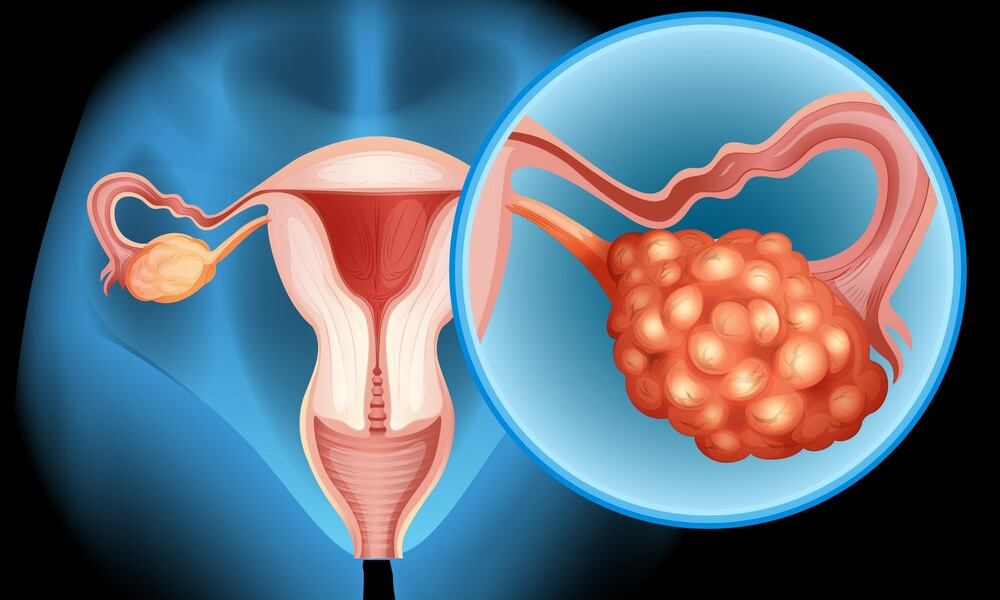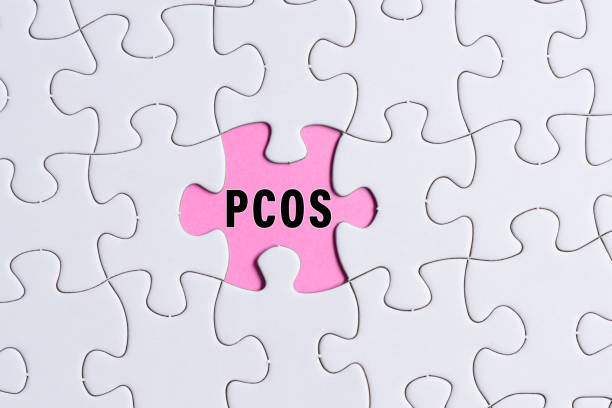Polycystic Ovary Syndrome (PCOS) affects up to 13% of women of reproductive age and is marked by a range of symptoms including irregular periods, acne, excessive hair growth, and weight gain. This hormonal disorder is characterized by high levels of androgens (male hormones) and often insulin resistance, which can also heighten the risk of developing diabetes and heart disease. Early detection and management are crucial to prevent these long-term health complications. However, up to 70% of affected women often going undiagnosed.
Fertility awareness emerges as a powerful tool for women with PCOS, whether wanting to understand their hormone health or trying to conceive. By diligently monitoring their menstrual cycles and recognizing the signs of ovulation, women with PCOS can enhance their chances of conceiving naturally, potentially avoiding invasive fertility treatments. Understanding the nuances of their cycles can empower these women to better manage their condition and work towards achieving a healthy pregnancy.
However, it is concerning that many women with PCOS lack adequate support to effectively manage their condition nor in utilizing fertility awareness methods to support them in achieving their reproductive health and fertility goals. As a practitioner, I advocate for providing more robust options and support to help women with PCOS take control of their reproductive health. In this blog, we will delve into how fertility awareness can assist women with PCOS in conceiving. We will also provide practical tips and strategies to make fertility awareness an effective part of managing PCOS.
Understanding PCOS and its impact on reproductive health is not only about managing symptoms but also about empowering women to have greater control over their health and reproductive decisions. Let’s explore the potential of fertility awareness in transforming the reproductive health journey for women with PCOS.
There are several different types of PCOS

- Insulin-resistant PCOS: This common type of PCOS happens when the body doesn’t use insulin effectively. Insulin helps control blood sugar levels, and when it doesn’t work properly, it can cause high insulin levels that affect the ovaries. This can lead to increased production of male hormones (androgens) and may cause problems with ovulation, making it harder to get pregnant.
- Inflammatory PCOS: This type of PCOS is linked to inflammation in the body. Everyone has some level of inflammation, but it can be worse in some people, especially if they’re overweight. This inflammation can mess with the way the body makes hormones, which can lead to PCOS symptoms. Even people who aren’t overweight can experience this if they have high levels of inflammation.
- Adrenal PCOS: This less common type of PCOS is due to the adrenal glands (small glands on top of the kidneys) producing too many male hormones. This can cause similar symptoms to other types of PCOS, like excess hair growth and acne. Special tests are needed to diagnose this type since it’s related to the adrenal glands rather than the ovaries.
- Post-pill PCOS: Some women might experience PCOS-like symptoms such as irregular periods and increased hair growth after they stop taking hormonal birth control pills. This happens because the pills previously controlled these hormones. Usually, this is temporary and symptoms often improve as the body adjusts and starts regulating its own hormones again.
The type of PCOS a woman has can impact her reproductive health. Women with insulin-resistant PCOS may have a more challenging time ovulating, while those with post-pill PCOS may experience irregular periods for several months after stopping birth control. Inflammatory PCOS may cause chronic inflammation in the body, which can impact overall health, including fertility. Adrenal PCOS may cause high levels of androgens, which can interfere with ovulation and cause other symptoms such as acne and hair growth.
Women with PCOS need to work closely with a qualified healthcare provider to understand their specific type of PCOS and how it may impact their fertility. Receiving treatment that considers their particular needs can increase the likelihood of women with PCOS getting the specific, individualized support they need.
Fertility Awareness Methods
Fertility awareness methods (FAM) offer a valuable tool for women with PCOS, providing insights into their reproductive health beyond solely conception. These methods, which include tracking basal body temperature, cervical fluid (also called cervical mucus), and menstrual cycle patterns, empower women to understand their bodies without the hormonal interference typical of contraceptives.
For women with PCOS, who often experience irregular cycles, FAM can be particularly beneficial. These methods do not suppress ovulation nor alter natural hormone levels, which is crucial for managing PCOS effectively. They also help in identifying ovulation patterns, which can be irregular and unpredictable with PCOS, providing clearer insights into their reproductive system’s health.
The basal body temperature technique, for instance, involves daily temperature measurements to detect the slight rise that occurs after ovulation. The cervical fluid technique tracks changes in fluid consistency—during ovulation, fluid becomes thinner and clearer, signaling higher fertility. The symptom-thermal method, which is the method I teach, combines several indicators, such as temperature and cervical changes, to pinpoint fertility more accurately.
Overall, FAM provides a natural, non-invasive approach to understanding fertility. It empowers women with PCOS not only to plan for pregnancy but also to monitor and manage their condition effectively. Let’s explore practical ways to apply these methods for women with PCOS, considering the unique challenges they face with this condition.
Using Fertility Awareness with PCOS
If you have PCOS, you know that it can affect your menstrual cycle and fertility. Because of this, using fertility awareness methods can be especially helpful in tracking your menstrual cycle and pinpointing ovulation.
Here are some tips for using fertility awareness with PCOS:
- Track your basal body temperature: One critical indicator of ovulation is a rise in basal body temperature. If you have PCOS, your menstrual cycle may be less predictable. Therefore, keeping track of your temperature daily can assist you in determining when ovulation is likely to occur.
- Monitor cervical fluid: Cervical fluid changes throughout your menstrual cycle, becoming thin and stretchy around ovulation. This can be more difficult to detect with PCOS, but paying close attention to changes in cervical fluid can still help you identify when you are most fertile.
- Use the sympto-thermal method: Because PCOS can make tracking fertility signs more challenging, using multiple fertility awareness techniques can help increase your accuracy. The sympto-thermal method, which combines tracking basal body temperature and cervical mucus, can be incredibly effective.
- Seek guidance: Working with a certified fertility awareness educator or qualified healthcare provider can be beneficial in learning how to track your fertility signs with PCOS. They can offer advice and support to help you use fertility awareness methods effectively and confidently.
In this next section, we will explore the more benefits of using fertility awareness for women with PCOS.
Benefits of Fertility Awareness for PCOS

If you have Polycystic Ovary Syndrome (PCOS), you may be all too familiar with the challenges that come with it. From irregular periods to hormonal imbalances, PCOS can be a complicated condition to navigate. Fortunately, fertility awareness methods can help you understand your menstrual cycle, manage PCOS symptoms, and even improve your chances of conceiving.
One benefit of fertility awareness for women with PCOS is that it allows you to track your menstrual cycle and understand your unique fertility signs. By doing so, you can better manage your PCOS symptoms and identify any irregularities in your cycle that may need medical attention. If you are trying to conceive, fertility awareness can help you determine the best time to pinpoint sex to optimize your chances of getting pregnant naturally.
In addition to helping with fertility and symptom management, fertility awareness can also provide a natural and hormone-free form of contraception for women with PCOS. This can be especially beneficial for those who may have adverse reactions to hormonal birth control methods.
By using fertility awareness methods to understand your menstrual cycle and fertility signs, It’s possible for you to have authority over your reproductive health and choose what’s best for your body through informed decisions. Whether you are trying to conceive or looking for a natural form of contraception, fertility awareness may be a valuable tool for managing PCOS and achieving your reproductive goals.
Why Fertility Awareness for PCOS
- Provides a non-invasive and natural method of contraceptive care
- It helps to identify the fertile window, increasing the chances of conception
- Understanding menstrual cycles and promoting hormonal balance are some of its benefits.
- Allows women to understand better and manage their PCOS symptoms
- Promotes a deeper understanding and connection to one’s own body and menstrual cycle
- Provides a sense of empowerment and control over one’s reproductive health
- Can potentially reduce the need for invasive fertility treatments
- Increases medical agency through body literacy
By now, it should be clear that fertility awareness methods can be a precious tool for managing PCOS and supporting your reproductive health goals. However, there are other essential considerations to remember when using these methods with PCOS. In the next section, we’ll explore the importance of working with someone qualified in supporting you in using fertility awareness consistently and correctly, as well as how fertility awareness can be supplemented with other PCOS treatments.
Other Considerations

Suppose you’re considering using fertility awareness to support in managing your PCOS symptoms or as a natural contraceptive. Working with a fertility awareness educator, functional nutrition and hormone specialist, or other qualified healthcare providers is essential. Professionals with expertise in this area can assist you in comprehending the proper and efficient utilization of the approach and support you in identifying any fundamental health problems that could affect your capacity to utilize FAM techniques to support your reproductive health or fertility goals.
It’s also important to remember that the effectiveness of fertility awareness methods relies on consistent and correct use. Track your fertility signs daily and follow the method’s guidelines precisely. If you’re using fertility awareness as contraception, it’s crucial to have a backup plan for when you’re most fertile, such as using condoms or avoiding sex.
While fertility awareness can be an excellent tool for supporting in the management of PCOS, it’s essential to supplement this method with other PCOS treatments. You can make lifestyle changes such as having a balanced diet, exercising regularly, using supplements, or taking medications that your healthcare provider has prescribed. By combining fertility awareness with other PCOS treatments, you can improve your likelihood of attaining ideal reproductive wellness.
Key Points & Conclusion
Let’s review the key points and reflect on the potential of fertility awareness for women with PCOS.
Key Points
- Anovulation and irregular periods are common symptoms of PCOS, a hormonal disorder that can have an impact on fertility.
- Tracking changes in the body to identify ovulation is a part of fertility awareness methods.
- If you are a woman with PCOS who wishes to conceive or better navigate your symptoms, FAM might be beneficial to you.
- Fertility awareness methods include various methods.
- The sympto-thermal method combines the best FAM techniques to increase the efficacy of the practice.
- Fertility awareness can support women with PCOS manage their symptoms by providing insight into hormonal fluctuations and identifying potential triggers.
- Fertility awareness can also support women with PCOS in optimizing conception by identifying fertile windows and optimizing the timing for intercourse.
- Other considerations for using fertility awareness with PCOS include working with a certified fertility awareness educator, consistent and correct use of the method, and supplementing with other PCOS treatments as needed.
- Overall, fertility awareness can be a valuable tool for women with PCOS looking to manage their condition and achieve their reproductive health goals.
Conclusion
Fertility awareness methods provide a range of benefits for women with PCOS, including the ability to support in managing symptoms, optimize the chance of getting pregnant, and use natural, hormone-free contraception. By paying attention to their fertility cues, women with PCOS can develop a deeper comprehension of their menstrual cycle and hormonal fluctuations. They can use this information to make informed decisions about their reproductive health.
It is important that women with PCOS work with a fertility awareness educator, functional nutrition and hormone specialist, or other qualified healthcare providers to ensure proper tracking and interpretation of fertility signs. Consistent and correct use of fertility awareness methods is also crucial for their effectiveness.
In addition to fertility awareness, women with PCOS may benefit from other support such as diet and lifestyle modifications, supplements, and medication. A comprehensive approach that includes fertility awareness can help women with PCOS better manage their condition and achieve their family planning goals.
If you have PCOS and are interested in exploring fertility awareness as a tool for managing your condition and achieving your family planning goals, I encourage you to speak with a certified fertility awareness educator to learn more about this empowering approach to reproductive health.
About Majida

Sources
- Bekhatroh, R. A., & Adel, I. N. (2019). How polycystic ovary syndrome (PCOS) affects the fertility potential of reproductive age females: Review. Global Journal of Public Health Medicine, 1(2), 77–84. https://doi.org/10.37557/gjphm.v1i2.21
- Fett, R. (2019). It starts with the egg: How the science of egg quality can help you get pregnant naturally, prevent miscarriage, and improve your odds in IVF. Franklin Fox Publishing.
- Gottfried, S. (2017). The hormone reset diet: Heal your metabolism to lose up to 15 pounds in 21 days. Collins.
- He, Y., Lu, Y., Zhu, Q., Wang, Y., Lindheim, S. R., Qi, J., Li, X., Ding, Y., Shi, Y., Wei, D., Chen, Z., & Sun, Y. (2019). Influence of metabolic syndrome on female fertility and in vitro fertilization outcomes in PCOS women. American Journal of Obstetrics and Gynecology, 221(2). https://doi.org/10.1016/j.ajog.2019.03.011
- Hendrickson-Jack, L. (2019). The fifth vital sign: Master your cycles & optimize your fertility. Fertility Friday Publishing Inc.
- McCulloch, F. (2016). 8 steps to reverse your PCOS: A proven program to reset your hormones, repair your metabolism and restore your fertility. Greenleaf Book Group Press.
- Pateguana, N. B., & Fung, J. (2020). The PCOS plan: Prevent and reverse polycystic ovary syndrome through diet and fasting. Greystone Books.
- Piltonen, T., Morin-Papunen, L., Ollila, M.-M., Tapanainen, J., Arffman, R., Järvelin, M.-R., & Franks, S. (2022). Women self-reporting PCOS symptoms should not be overlooked. Human Reproduction, 38(1), 189–190. https://doi.org/10.1093/humrep/deac251
- Shah, D. (2023). Management of PCOS in adolescence – can we improve future fertility by treating before and in adolescence. Fertility & Reproduction, 05(04), 302–302. https://doi.org/10.1142/s2661318223741164
- Singer, K. (2004). The Garden of Fertility: A Guide to charting your fertility signals to prevent or achieve pregnancy – naturally – and to gauge your reproductive health. Avery.
- Spencer, T. (2017). PCOS diet for the newly diagnosed: Your all-in-one guide to eliminating PCOS symptoms with the insulin resistance diet. Rockridge Press.
- Vitti, A. (2014). Womancode: Perfect your cycle, amplify your fertility, supercharge your sex drive, and become a power source. HarperOne.
- Wal, A., Wal, P., Saraswat, N., & Wadhwa, S. (2021). A detailed review on herbal treatments for treatment of PCOS- polycystic ovary syndrome (PCOS). Current Nutraceuticals, 2(3), 192–202. https://doi.org/10.2174/2665978602666210805092103
- Weschler, T. (2015). Taking Charge of Your Fertility: The Definitive Guide to Natural Birth Control, Pregnancy Achievement, and Reproductive Health (20th Anniversary Edition). William Morrow Paperbacks.
Disclaimer:
The information provided on this blog is for educational and informational purposes only and is not intended as a substitute for professional medical advice, diagnosis, or treatment. Always seek the advice of your physician or other qualified health provider with any questions you may have regarding a medical condition. The content on this blog is not meant to replace professional medical advice or to be used to prevent, diagnose, or treat any disease or illness. Reliance on any information provided by this blog is solely at your own risk.











